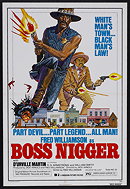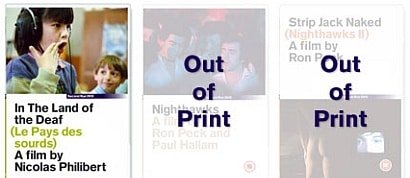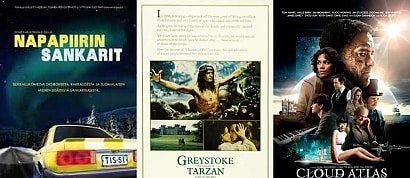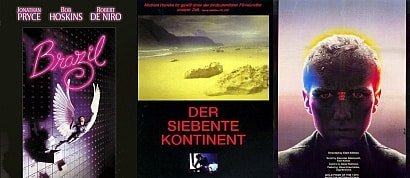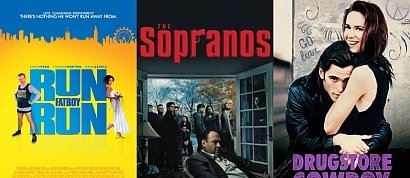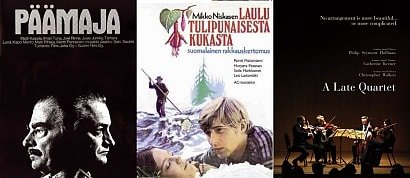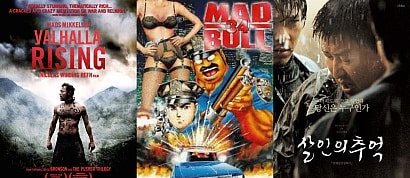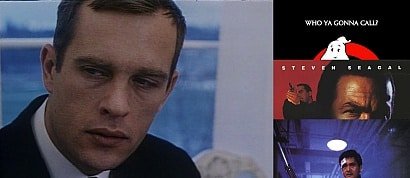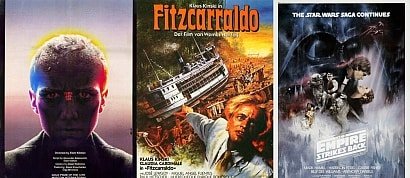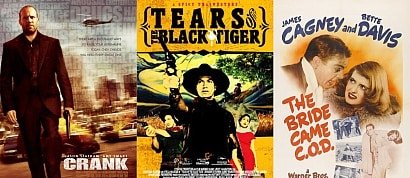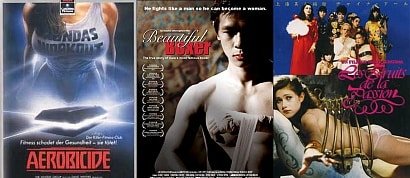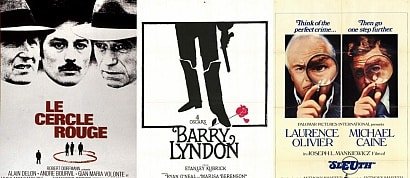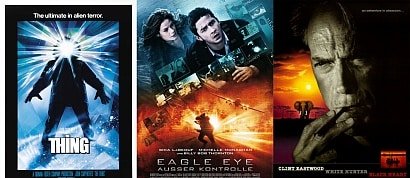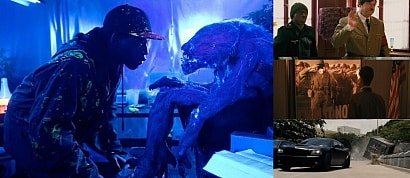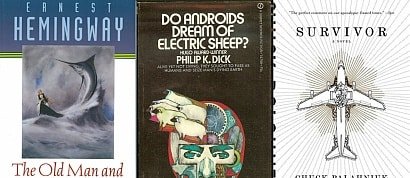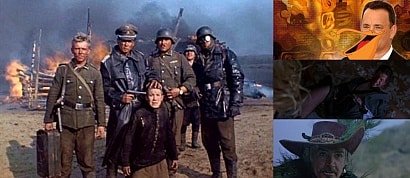Filmic Fatal Six-Way
Sort by:
Showing 30 items
Decade:
Rating:
List Type:
 Add items to section
Add items to section
Lamo "Da Barn" urhaaja's Five
The Smell of Burning Ants (1994)
16. 4/11/2013
Oh man, it's been almost a year since I started this thing. That's depressing. You'd think it was easier to get around to watching these films than this. But heck, what do you know? Turns out I want to watch other things more than some of these, which isn't necessarily even a nag against these films. Anyhow, I'm glad I got to watch The Smell of Burning Ants due to this project.
Jay Rosenblatt, known for drawing from his life to create short films, made this one. It's about childhood in general. It reflects his views on, especially, gender defined education and pedagogy, the concepts of social and physical punishment and their lasting psychological effects, and the meaning, or lack thereof, of words as a child. The first two it binds together. Children are driven to their adult gender roles through the societal norms that are enforced through the traditional roles of their own parents, who usually enforce punishment, be it berating or painful, when the child acts out of the role they intend for them.
The meaning of words is shown over the course of a few scenes, as children call each other out with increasingly ludicrous insults. But these words mean absolutely nothing in the context they're said in. Not only do they not bear meaning, the only thing with any meaning, or indeed capability to affect what is happening, is physical violence or acting out in some manner, be it beating another kid or murdering insects.

The dominant emotion throughout the film is despair. Despair at children being brought up under this duress. It portrays childhood as this pot of inequality, darkness and endless facades aimed at conforming with what others expect of you. And in this goal of delivering this message with a brutal execution it succeeds. The narrative is impressively sparse, and it feels as if there is not a single excessive frame in this entire film.
This also goes for the final shots, depicting what appears to be nothing short of a rape between a man and woman. Can children brought up within the hell this film depicts ever live through something like a sexual encounter without it becoming a disgusting depravity? It's a good thing these psychological traumas have a tendency to heal, but the ending, in all it's brutality, is very suited to the rest of the film and leaves a very bad taste, in the utmost right way, in your mouth.
Oh man, it's been almost a year since I started this thing. That's depressing. You'd think it was easier to get around to watching these films than this. But heck, what do you know? Turns out I want to watch other things more than some of these, which isn't necessarily even a nag against these films. Anyhow, I'm glad I got to watch The Smell of Burning Ants due to this project.
Jay Rosenblatt, known for drawing from his life to create short films, made this one. It's about childhood in general. It reflects his views on, especially, gender defined education and pedagogy, the concepts of social and physical punishment and their lasting psychological effects, and the meaning, or lack thereof, of words as a child. The first two it binds together. Children are driven to their adult gender roles through the societal norms that are enforced through the traditional roles of their own parents, who usually enforce punishment, be it berating or painful, when the child acts out of the role they intend for them.
The meaning of words is shown over the course of a few scenes, as children call each other out with increasingly ludicrous insults. But these words mean absolutely nothing in the context they're said in. Not only do they not bear meaning, the only thing with any meaning, or indeed capability to affect what is happening, is physical violence or acting out in some manner, be it beating another kid or murdering insects.

The dominant emotion throughout the film is despair. Despair at children being brought up under this duress. It portrays childhood as this pot of inequality, darkness and endless facades aimed at conforming with what others expect of you. And in this goal of delivering this message with a brutal execution it succeeds. The narrative is impressively sparse, and it feels as if there is not a single excessive frame in this entire film.
This also goes for the final shots, depicting what appears to be nothing short of a rape between a man and woman. Can children brought up within the hell this film depicts ever live through something like a sexual encounter without it becoming a disgusting depravity? It's a good thing these psychological traumas have a tendency to heal, but the ending, in all it's brutality, is very suited to the rest of the film and leaves a very bad taste, in the utmost right way, in your mouth.
VierasTalo's rating:


The Sword of Doom (1966)
3.
8/12/2012
A samurai named Ryunosuke Tsukue comes upon an old man on top of a mountain pass. He kills him for no reason, then walks back home. The following days, he participates in a duel with another samurai that his father wishes he would lose. He instead kills his opponent, and all those who try to kill him for doing so. Two years later, he has killed more and continues to kill until the end of the film. He kills everyone around him eventually. We never feel an ounce of sympathy for this man or his actions. At most we get glimpses of what causes this drive to kill. But really, we know fairly early on that this man is nothing but a pure psychopath. The impressive performance from Tatsuya Nakadai as the killer brings to memory images of the likes of Peter Lorre, bug-eyed murderers with emptiness in their eyes. Nakadai's Ryunosuke effectively rejects life, not only by taking it from those around him, but also by hence driving them out of his own, making it empty and meaningless and full of some sort of pitiful, impotent rage. The movie climaxes in a tea house, where Nakadai finally briefly faces his inner demons, slashing away at the bamboo and paper walls on which those he has slain without reason are reflected as shadows. By the end the house is in ruins, loose sheets of paper gliding softly about and I couldn't help but think of the Gothic castles of old monster movies with their liberal use of cobwebs to inspire the feeling of dread and terror. This made it seem as if the tea house had essentially become the very inside of Nakadai's head, brooming with memories of those he had driven away with his sword.

I have not seen many Samurai films but the image I have of them radically differs from what we see in The Sword of Doom. Conflicted heroes seem to be a common trait but all the heroes in this movie are either sidelined or killed by our main character. This further embroils us into the psyche of this murderer, and his existence in the film's universe is a fact that is unavoidable. There is plenty of espionage and scheming going on around him, and he is used as a catalyst for many a plot, but in the end he just kills more people and drops deeper into whatever hole he is already drowning in when the film opens. I'm somewhat flabbergasted at the prospect of speaking about anything else than Ryunosuke Tsukue when talking about this movie, but I think that just speaks for the strength here. The Sword of Doom creates an iconic villain on par with the best, and it stays with you. On a rewatch, I might pay more attention to other things such as the people around this merciless wreck of a human being, but on this first viewing his actions and behavior were far too disturbing for me to stop and think about everything else that was happening. A shocking experience.
8/12/2012
A samurai named Ryunosuke Tsukue comes upon an old man on top of a mountain pass. He kills him for no reason, then walks back home. The following days, he participates in a duel with another samurai that his father wishes he would lose. He instead kills his opponent, and all those who try to kill him for doing so. Two years later, he has killed more and continues to kill until the end of the film. He kills everyone around him eventually. We never feel an ounce of sympathy for this man or his actions. At most we get glimpses of what causes this drive to kill. But really, we know fairly early on that this man is nothing but a pure psychopath. The impressive performance from Tatsuya Nakadai as the killer brings to memory images of the likes of Peter Lorre, bug-eyed murderers with emptiness in their eyes. Nakadai's Ryunosuke effectively rejects life, not only by taking it from those around him, but also by hence driving them out of his own, making it empty and meaningless and full of some sort of pitiful, impotent rage. The movie climaxes in a tea house, where Nakadai finally briefly faces his inner demons, slashing away at the bamboo and paper walls on which those he has slain without reason are reflected as shadows. By the end the house is in ruins, loose sheets of paper gliding softly about and I couldn't help but think of the Gothic castles of old monster movies with their liberal use of cobwebs to inspire the feeling of dread and terror. This made it seem as if the tea house had essentially become the very inside of Nakadai's head, brooming with memories of those he had driven away with his sword.

I have not seen many Samurai films but the image I have of them radically differs from what we see in The Sword of Doom. Conflicted heroes seem to be a common trait but all the heroes in this movie are either sidelined or killed by our main character. This further embroils us into the psyche of this murderer, and his existence in the film's universe is a fact that is unavoidable. There is plenty of espionage and scheming going on around him, and he is used as a catalyst for many a plot, but in the end he just kills more people and drops deeper into whatever hole he is already drowning in when the film opens. I'm somewhat flabbergasted at the prospect of speaking about anything else than Ryunosuke Tsukue when talking about this movie, but I think that just speaks for the strength here. The Sword of Doom creates an iconic villain on par with the best, and it stays with you. On a rewatch, I might pay more attention to other things such as the people around this merciless wreck of a human being, but on this first viewing his actions and behavior were far too disturbing for me to stop and think about everything else that was happening. A shocking experience.
VierasTalo's rating:


 Add items to section
Add items to section
Ruis "Toiletsleeper" perkele's Five
8.
12/12/2012
So yeah, I have no real clue as to what the hell I just watched. I guess that's surrealism! Really though, this is a tough nut to crack. People tend to think Lynch is tough but there's a difference to me between confusing and symbolical. L'Age d'Or is confusing on purpose. It tells a rather straightforward story, but the narrative is littered with little details that make it a weird experience to the extreme. Bunuel's often cited hatred toward the bourgeois seems to have it's roots firmly planted here, as we see the noblemen and women flounder sexually only for their efforts to be thwarted by various authoritative figures, much like the bourgeois folk who consistently fail to have a dinner party in Bunuel's much later Discreet Charm of the Bourgeois. The difference between that film and L'Age d'Or, or any later Bunuel film, is that there is a certain raw edge to L'Age d'Or. It's very in-your-face. There's a scene in the end that basically says that Jesus Christ came to earth to rape young girls and scalp their heads onto a cross.

These sorts of images are obviously provocative and occasionally appear, at least to me, to be nothing but that. But I was completely fine with them, as Bunuel has an eye for very, very dark humor. The above mentioned Jesus-scene being just one example. Earlier on we see a hyper-sexualized couple eating each other's hands in exaggerated ecstasy, or a cow hanging out on top of a lady's bed only to be shooed into a closet. There have been many interpretations made of this film, and I am not yet suited to offer my own, as such would require a deep analysis of the zeitgeist of the time it was made and repeated viewings, and the whole point of this project is to give new viewings to movies I've never seen. However I do think it's rather clear that Bunuel showcases most sexual or otherwise differing contact between people being obstructed by authoritative figures, often resulting in acts of violence by these people towards other people. This yet again brings out the dark sense of humor Bunuel has, as a goodwill-member kicks down a blind man in jest after being escorted around town by a police. I can't say that I entirely loved L'Age d'Or though, as I feel myself to more enjoy his later, more refined works. Don't mistake me, this film absolutely works because of it's raw, jagged way of presenting violent, funny and disturbing imagery, but I feel this is something Bunuel grew out of into something more universal in his later works. L'Age d'Or feels like a shockfest, but in Discreet Charm such shocks are saved for moments when you last expect them coming. This is still pretty goddamn impressive for a second feature.
12/12/2012
So yeah, I have no real clue as to what the hell I just watched. I guess that's surrealism! Really though, this is a tough nut to crack. People tend to think Lynch is tough but there's a difference to me between confusing and symbolical. L'Age d'Or is confusing on purpose. It tells a rather straightforward story, but the narrative is littered with little details that make it a weird experience to the extreme. Bunuel's often cited hatred toward the bourgeois seems to have it's roots firmly planted here, as we see the noblemen and women flounder sexually only for their efforts to be thwarted by various authoritative figures, much like the bourgeois folk who consistently fail to have a dinner party in Bunuel's much later Discreet Charm of the Bourgeois. The difference between that film and L'Age d'Or, or any later Bunuel film, is that there is a certain raw edge to L'Age d'Or. It's very in-your-face. There's a scene in the end that basically says that Jesus Christ came to earth to rape young girls and scalp their heads onto a cross.

These sorts of images are obviously provocative and occasionally appear, at least to me, to be nothing but that. But I was completely fine with them, as Bunuel has an eye for very, very dark humor. The above mentioned Jesus-scene being just one example. Earlier on we see a hyper-sexualized couple eating each other's hands in exaggerated ecstasy, or a cow hanging out on top of a lady's bed only to be shooed into a closet. There have been many interpretations made of this film, and I am not yet suited to offer my own, as such would require a deep analysis of the zeitgeist of the time it was made and repeated viewings, and the whole point of this project is to give new viewings to movies I've never seen. However I do think it's rather clear that Bunuel showcases most sexual or otherwise differing contact between people being obstructed by authoritative figures, often resulting in acts of violence by these people towards other people. This yet again brings out the dark sense of humor Bunuel has, as a goodwill-member kicks down a blind man in jest after being escorted around town by a police. I can't say that I entirely loved L'Age d'Or though, as I feel myself to more enjoy his later, more refined works. Don't mistake me, this film absolutely works because of it's raw, jagged way of presenting violent, funny and disturbing imagery, but I feel this is something Bunuel grew out of into something more universal in his later works. L'Age d'Or feels like a shockfest, but in Discreet Charm such shocks are saved for moments when you last expect them coming. This is still pretty goddamn impressive for a second feature.
VierasTalo's rating:


The Double Life of Véronique (1991)
1.
8/12/2012
Starting off the entire project since I had the DVD laying around on my shelves for years now is Kieslowski's modern classic about two women, Véronique and Wéronique, who feel connected in the world despite living countries apart and never seeing one another. Music plays a large part in both their lives, meaning that herr director gets yet another chance to fill our ears and eyes with wonderful audiovisual moments featuring beautiful original music on par with that of Three Colors: Blue if you ask me.
The music just further drives home what I think about Kieslowski as a director. He seems to take the viewer's role as a mere observer more seriously than most filmmakers, forcing you to become involved with the events. He does this not just through music but perhaps in a more noticeable way through clever use of cinematography. Take for example that many shots have a mildly reflective surface between us and Véronique/Wéronique. We see the passing people in the street below their apartments but we also see their reaction to everything they see. A metaphorical form of some surreal cosmic unity distilled into a single shot. For those brief periods, shots like this make us feel, to some slight extent, the same feelings of belonging and being within the world as our two main characters do of each other's existence without any particular knowledge of it.
Another effect that effectively pulled me in was the obscuring of what is shown on screen through lens effects. Often there are glares, minor blurring or spots on the camera lens that make it more difficult to see the intimate scenes taking place in the film. When you really start having to observe instead of merely look at the events, you notice becoming almost intimately involved with these moments. It feels especially effective when Véronique is making love to her ex-boyfriend. You're there as well, looking from the sidelines, without them ever noticing. It seems as if Kieslowski acknowledges this perverted nature by making you as aware of it as he is through his cinematic mastery. To be fair, some of the technical prowess on display can certainly be accredited to veteran cinematographer Slawomir Idziak.

Thematically speaking I kind of saw a few connections to Terrence Malick's recent Tree of Life. The films is almost as if written in an essay-ish format, lacking a particularly narrative plot, relying instead on events and singular moments in time that revolve around themes of what life is in a more philosophical sense. The scope, however, is much more limited than what Malick had, and as a result the two films stand much apart despite trying to solve the same riddle of what exactly, if anything, is the human soul. The human existence. Films like The Double Life of Véronique or The Tree of Life will probably never come close to solving this mystery. The only thing that might be able to solve it is death. But culture, art, such as these films is capable of bringing us into a state of emotion where we feel, at least for brief moments as Véronique touches an old tree in her father's yard or when Wéronique's soul passes over an audience, closer to having a possibility to truly accept that this is can not be solved by us but that it may still have a solution. That's beautiful, in a way. Comforting.
8/12/2012
Starting off the entire project since I had the DVD laying around on my shelves for years now is Kieslowski's modern classic about two women, Véronique and Wéronique, who feel connected in the world despite living countries apart and never seeing one another. Music plays a large part in both their lives, meaning that herr director gets yet another chance to fill our ears and eyes with wonderful audiovisual moments featuring beautiful original music on par with that of Three Colors: Blue if you ask me.
The music just further drives home what I think about Kieslowski as a director. He seems to take the viewer's role as a mere observer more seriously than most filmmakers, forcing you to become involved with the events. He does this not just through music but perhaps in a more noticeable way through clever use of cinematography. Take for example that many shots have a mildly reflective surface between us and Véronique/Wéronique. We see the passing people in the street below their apartments but we also see their reaction to everything they see. A metaphorical form of some surreal cosmic unity distilled into a single shot. For those brief periods, shots like this make us feel, to some slight extent, the same feelings of belonging and being within the world as our two main characters do of each other's existence without any particular knowledge of it.
Another effect that effectively pulled me in was the obscuring of what is shown on screen through lens effects. Often there are glares, minor blurring or spots on the camera lens that make it more difficult to see the intimate scenes taking place in the film. When you really start having to observe instead of merely look at the events, you notice becoming almost intimately involved with these moments. It feels especially effective when Véronique is making love to her ex-boyfriend. You're there as well, looking from the sidelines, without them ever noticing. It seems as if Kieslowski acknowledges this perverted nature by making you as aware of it as he is through his cinematic mastery. To be fair, some of the technical prowess on display can certainly be accredited to veteran cinematographer Slawomir Idziak.

Thematically speaking I kind of saw a few connections to Terrence Malick's recent Tree of Life. The films is almost as if written in an essay-ish format, lacking a particularly narrative plot, relying instead on events and singular moments in time that revolve around themes of what life is in a more philosophical sense. The scope, however, is much more limited than what Malick had, and as a result the two films stand much apart despite trying to solve the same riddle of what exactly, if anything, is the human soul. The human existence. Films like The Double Life of Véronique or The Tree of Life will probably never come close to solving this mystery. The only thing that might be able to solve it is death. But culture, art, such as these films is capable of bringing us into a state of emotion where we feel, at least for brief moments as Véronique touches an old tree in her father's yard or when Wéronique's soul passes over an audience, closer to having a possibility to truly accept that this is can not be solved by us but that it may still have a solution. That's beautiful, in a way. Comforting.
VierasTalo's rating:


Boss Nigger (1974)
17.
9/11/2013

Boss Nigger, despite its title, doesn't seem to entirely rely on the blaxploitation roots it clearly has. It's more of a hybrid between the American western, a spaghetti western and the aforementioned blaxploitation. The setting and atmosphere is straight out of a John Wayne-film, the basic plot of bounty hunters/strangers in a town saving the place from bandits is out of the Leone-inspired genre, as is the surprising melancholy of the ending. The blaxploitation... well, you have Fred Williamson starring as a character called BOSS who, despite appearing to be a walking ton of bricks, has a decent and even painful side to him by the end. In blaxploitation, it is not uncommon for heroes to be all muscle and daring until they get shot. The bitter end and the human angle is not uncommon for these unsong heroes, and this is true of the Boss as well. As he gets shot, he cries in agony, trying to still do what is right. More of a man than most straight-as-an-arrow/invulnerable western heroes are.
It's also a weird movie in the sense that it actually feels and looks like an actual movie despite being a blaxploitation. The camera has a tripod and no boom mics show up in any of the shots. The only problem on the technical side isn't even the film's fault, because the DVDs out there are all horrible shit in every respect. Shameless should grab this at some point and put it out there, because hey, it's actually a really entertaining action movie with good humor and plenty o' romp'n'stomp to keep anyone entertained.
9/11/2013

Boss Nigger, despite its title, doesn't seem to entirely rely on the blaxploitation roots it clearly has. It's more of a hybrid between the American western, a spaghetti western and the aforementioned blaxploitation. The setting and atmosphere is straight out of a John Wayne-film, the basic plot of bounty hunters/strangers in a town saving the place from bandits is out of the Leone-inspired genre, as is the surprising melancholy of the ending. The blaxploitation... well, you have Fred Williamson starring as a character called BOSS who, despite appearing to be a walking ton of bricks, has a decent and even painful side to him by the end. In blaxploitation, it is not uncommon for heroes to be all muscle and daring until they get shot. The bitter end and the human angle is not uncommon for these unsong heroes, and this is true of the Boss as well. As he gets shot, he cries in agony, trying to still do what is right. More of a man than most straight-as-an-arrow/invulnerable western heroes are.
It's also a weird movie in the sense that it actually feels and looks like an actual movie despite being a blaxploitation. The camera has a tripod and no boom mics show up in any of the shots. The only problem on the technical side isn't even the film's fault, because the DVDs out there are all horrible shit in every respect. Shameless should grab this at some point and put it out there, because hey, it's actually a really entertaining action movie with good humor and plenty o' romp'n'stomp to keep anyone entertained.
VierasTalo's rating:


Fractured Follies (1988)
13.
19/1/2013
The charm in Hong Kong comedy of the 80s and early 90s is that, for one, we get to see numerous actors in roles where you wouldn't see them in the types of films they broke into the mainstream with. The most glaring example of this is Chow-Yun Fat, who has mostly made serious dramatic roles or action movies in the US and is mostly renown for his action movies made with John Woo. But in movies like Fractured Follies and especially Diary of a Big Man, one of the best comedies of all time, we see a different Fat. He is a bumbling buffoon with some degree of success with women, but the ungodly mess he makes when something goes wrong is astonishing, and Fat is perfect at pulling these roles off. Be it when shooting a gun or singing a song about fruit while dressed as a pineapple, he is utterly convincing. This holds true of many other actors in the genre as well.

The second trait that I find particularly attractive is the notion of a sort of cinema verite-filmmaking present here. These are not documentaries, but the screenplays, if they even existed, always portray the quality of randomness. The chains of events, be they about relationships or economic rivalry, always escalate to the point where anything can, and usually does, happen. This is a thing that often borders on the fine line between being completely random and being plausible. An event may have no direct link to the previous things, but it always seems like something that might in a 1:100 000 000-chance happen to a character in this universe. This is why, during Fractured Follies, we see Fat not only dressed as a woman (business as usual in HK-comedies as far as that side goes) but also get thrown in slow-motion through glass, take down an illegal voyeuristic porn ring, take horrible advice from a fake buddha, and my personal favorite, the scene the movie practically starts with, in which Fat drives a taxi over a woman, and as she dangles from the hood of his car, he drives the car into a solid brick wall. This being said though, Fractured Follies doesn't go to the top of the HK-comedies. It's a steady, consistently entertaining romp, but doesn't give quite the ample amount of laughs one could get out of some of the other films such as Diary.
19/1/2013
The charm in Hong Kong comedy of the 80s and early 90s is that, for one, we get to see numerous actors in roles where you wouldn't see them in the types of films they broke into the mainstream with. The most glaring example of this is Chow-Yun Fat, who has mostly made serious dramatic roles or action movies in the US and is mostly renown for his action movies made with John Woo. But in movies like Fractured Follies and especially Diary of a Big Man, one of the best comedies of all time, we see a different Fat. He is a bumbling buffoon with some degree of success with women, but the ungodly mess he makes when something goes wrong is astonishing, and Fat is perfect at pulling these roles off. Be it when shooting a gun or singing a song about fruit while dressed as a pineapple, he is utterly convincing. This holds true of many other actors in the genre as well.

The second trait that I find particularly attractive is the notion of a sort of cinema verite-filmmaking present here. These are not documentaries, but the screenplays, if they even existed, always portray the quality of randomness. The chains of events, be they about relationships or economic rivalry, always escalate to the point where anything can, and usually does, happen. This is a thing that often borders on the fine line between being completely random and being plausible. An event may have no direct link to the previous things, but it always seems like something that might in a 1:100 000 000-chance happen to a character in this universe. This is why, during Fractured Follies, we see Fat not only dressed as a woman (business as usual in HK-comedies as far as that side goes) but also get thrown in slow-motion through glass, take down an illegal voyeuristic porn ring, take horrible advice from a fake buddha, and my personal favorite, the scene the movie practically starts with, in which Fat drives a taxi over a woman, and as she dangles from the hood of his car, he drives the car into a solid brick wall. This being said though, Fractured Follies doesn't go to the top of the HK-comedies. It's a steady, consistently entertaining romp, but doesn't give quite the ample amount of laughs one could get out of some of the other films such as Diary.
VierasTalo's rating:


15.
16/8/2013

Oh man, fuck off Ruis. Here's a Shaw Bros-movie from the 70s, arguably their golden age! It's an adaptation of an epic Chinese classic! And guess what? It only adapts chapters 64-68. Those chapters. So you best brush up on chapters 1-63 before seeing this movie because you will have no fucking idea as to what is going on otherwise.
Which is a problem. The film contains about a hundred named characters who are all individually introduced to us by on-screen titles when they appear. Half of them never speak a word. Some are never seen after their initial introduction. But this method sure ensures that when the speaking roles do speak about other characters, you'll have no idea who or what they talk about. Eventually I latched on to some of the story, began ignoring all the dialogue and just watch the movie as this weird narrative experiment. And it was OK, except really boring because the vast majority of the understandable stuff in the movie contains repeated prison breaks and re-captures. It's jarring. The eventual action might be OK if it wasn't shot like ass.
16/8/2013

Oh man, fuck off Ruis. Here's a Shaw Bros-movie from the 70s, arguably their golden age! It's an adaptation of an epic Chinese classic! And guess what? It only adapts chapters 64-68. Those chapters. So you best brush up on chapters 1-63 before seeing this movie because you will have no fucking idea as to what is going on otherwise.
Which is a problem. The film contains about a hundred named characters who are all individually introduced to us by on-screen titles when they appear. Half of them never speak a word. Some are never seen after their initial introduction. But this method sure ensures that when the speaking roles do speak about other characters, you'll have no idea who or what they talk about. Eventually I latched on to some of the story, began ignoring all the dialogue and just watch the movie as this weird narrative experiment. And it was OK, except really boring because the vast majority of the understandable stuff in the movie contains repeated prison breaks and re-captures. It's jarring. The eventual action might be OK if it wasn't shot like ass.
VierasTalo's rating:


 Add items to section
Add items to section
"The Whizzer" Tapio's Five
5.
9/12/2012

Silent Running is a sci-fi movie about a spaceship harboring four domes, each containing a piece of the Earth's forest. For whatever reason the flora could no longer be maintained on Earth, and had to be launched off into space. It's never exactly explained as to why these domes couldn't have been built just on earth, but that's not really the point. A gardener played by Bruce Dern has been tending for these domes for seven years. When his crew gets word from Earth that they need to be destroyed because American Airlines wants to take the ships back to commercial use, Dern says fuck to that and offs his other crewmates and makes a daring escape with one of the domes. He still has three robot droids for company, and he develops an affectionate relationship with them. This relationship really is the best thing about this, because Dern plays such a genuinely nice guy that you really want to see him happy socializing with his little robots. As tragedy strikes the robots, it strikes us as well.
It's just too bad that this aspect is sort of hindered by the short runtime, but with the small story, I don't see how it could be much longer without feeling drawn out. As it stands, this is a nice small sci-fi flick from a time when those movies were just starting up. I just can't help but feel that all the enviromental message in this film is a bit ham-fisted. Dern gives a great monologue about the connection between imagination and nature (nature causes chaos which feeds the imagination ergo without nature the imagination withers), but that's about it if you don't take into consideration two overtly outdated hippie songs about the nature being fly, man.
9/12/2012

Silent Running is a sci-fi movie about a spaceship harboring four domes, each containing a piece of the Earth's forest. For whatever reason the flora could no longer be maintained on Earth, and had to be launched off into space. It's never exactly explained as to why these domes couldn't have been built just on earth, but that's not really the point. A gardener played by Bruce Dern has been tending for these domes for seven years. When his crew gets word from Earth that they need to be destroyed because American Airlines wants to take the ships back to commercial use, Dern says fuck to that and offs his other crewmates and makes a daring escape with one of the domes. He still has three robot droids for company, and he develops an affectionate relationship with them. This relationship really is the best thing about this, because Dern plays such a genuinely nice guy that you really want to see him happy socializing with his little robots. As tragedy strikes the robots, it strikes us as well.
It's just too bad that this aspect is sort of hindered by the short runtime, but with the small story, I don't see how it could be much longer without feeling drawn out. As it stands, this is a nice small sci-fi flick from a time when those movies were just starting up. I just can't help but feel that all the enviromental message in this film is a bit ham-fisted. Dern gives a great monologue about the connection between imagination and nature (nature causes chaos which feeds the imagination ergo without nature the imagination withers), but that's about it if you don't take into consideration two overtly outdated hippie songs about the nature being fly, man.
VierasTalo's rating:


Cleopatra (1963)
10.
16/12/2012
Cleopatra is not deserving of the four Oscars it won in 1963. It deserved three of them. The fourth, for best cinematography, should have been granted elsewhere. This film on a cinematographical level looks as good as an episode of Bold and Beautiful. The framing shows strictly what is going on in the scene, eg. two actors speaking to each other, or pans from right to left or left to right to show the scenery. The innovation is gone and all that remains is stiff camerawork. However, everything that the camera shows us is gorgeous. Cleopatra remains one of the most expensive films of all time, and every dollar of it's budget is touted on-screen in beautiful costumes, sets and decorations. It's a shame that the film itself is not on par with these Oscar-winning sets and special effects, but rather all too much like the dull, run of the mill cinematography. For one, it runs about four hours long. The original cut is supposed to have been around six hours. I can't imagine ever watching that, because this version was already an utter pain to go through. The first two hours deals with Cleopatra's relationship to Julius Caesar, and consists of one brief and absurdly small-in-scale to the rest of the film fight scene, and about a hundred minutes worth of people standing around in epic sets talking to one another, rarely showing any particular emotion.

The next two hours revolve around Cleopatra's relationship to Mark Antony, and it has yet another fight scene, this time suiting to the scale of the rest of the film, but at the same time being very, very boring to watch as it comes at around the three hour-mark when this film has used up all goodwill I may have had for it in the beginning. The other scenes are yet more talking of characters in big sets, shot in long, painful takes of with nothing happening in them. At least Antony is played by Richard Burton, who appears to be the only person in this movie capable of acting to save his life. Too bad that the role is so hollow and archaic that he has nothing to work with. By the end we get a tragic twenty minutes of pathos-filled anger and deceit, but at that point it is yet again very difficult to care at any capacity. Really, I hated watching this film. It's the complete opposite of what I think film should be. There is nothing innovative, inspiring or touching about this movie. The way it was made seems to be so industrial that it makes me furious. Yet, so much money is on-screen at all times that it occasionally turns into impressive moments. Elizabeth Taylor also doses out a helpful amount of her perfect cleavage, and this is why I give this 1½ stars instead of one.
16/12/2012
Cleopatra is not deserving of the four Oscars it won in 1963. It deserved three of them. The fourth, for best cinematography, should have been granted elsewhere. This film on a cinematographical level looks as good as an episode of Bold and Beautiful. The framing shows strictly what is going on in the scene, eg. two actors speaking to each other, or pans from right to left or left to right to show the scenery. The innovation is gone and all that remains is stiff camerawork. However, everything that the camera shows us is gorgeous. Cleopatra remains one of the most expensive films of all time, and every dollar of it's budget is touted on-screen in beautiful costumes, sets and decorations. It's a shame that the film itself is not on par with these Oscar-winning sets and special effects, but rather all too much like the dull, run of the mill cinematography. For one, it runs about four hours long. The original cut is supposed to have been around six hours. I can't imagine ever watching that, because this version was already an utter pain to go through. The first two hours deals with Cleopatra's relationship to Julius Caesar, and consists of one brief and absurdly small-in-scale to the rest of the film fight scene, and about a hundred minutes worth of people standing around in epic sets talking to one another, rarely showing any particular emotion.

The next two hours revolve around Cleopatra's relationship to Mark Antony, and it has yet another fight scene, this time suiting to the scale of the rest of the film, but at the same time being very, very boring to watch as it comes at around the three hour-mark when this film has used up all goodwill I may have had for it in the beginning. The other scenes are yet more talking of characters in big sets, shot in long, painful takes of with nothing happening in them. At least Antony is played by Richard Burton, who appears to be the only person in this movie capable of acting to save his life. Too bad that the role is so hollow and archaic that he has nothing to work with. By the end we get a tragic twenty minutes of pathos-filled anger and deceit, but at that point it is yet again very difficult to care at any capacity. Really, I hated watching this film. It's the complete opposite of what I think film should be. There is nothing innovative, inspiring or touching about this movie. The way it was made seems to be so industrial that it makes me furious. Yet, so much money is on-screen at all times that it occasionally turns into impressive moments. Elizabeth Taylor also doses out a helpful amount of her perfect cleavage, and this is why I give this 1½ stars instead of one.
VierasTalo's rating:


 Add items to section
Add items to section
"Orange" Tiiviste's Five
2.
8/12/2012
1 A man kills and buries his wife, only to find her back in their house when he returns. The wife beats him and he kills her in self-defense. The cycle repeats endlessly.
2 An ad exec records her silly ideas to a portable tape recorder. Her sense of humor does not strike anyone else as funny.
3 The salaryman of an average Japanese family is turned into a bird by a hypnotist, but after the hypnotist dies the man stays a bird. Everyone is frustrated.
4 Three burglars hang out and talk shit. A single joke is repeated several times and is the only joke in the story. Two of the men stare into each other's eyes in an erotic way as a disco song plays.
5 Vinnie Jones visits all the previous stories as a hitman, killing the other characters or asking them to tell him their function in life.
1 The best story in the entire film, portraying a never ending nightmare with occasional glimpses of positive oddity as the wife's ghost shoots rocket fists at the husband. The story is also the only one with any particular amount of interesting things happening in it, as the house's interior changes according to the wife's ever-changing outfits, causing fun visual circulation in an otherwise rather flat film.
2 We see the ad lady's advertisements as she records them to her camcorder. There's a reason people look down on her sense of humor, as some of these ads are just awful. This story also has absolutely no climax. It just ends and is never returned to.
3 A fun premise is stretched out to the point of becoming boring. The family's financial situation is originally explained as being very poor but the father becoming a bird and hence loosing his job doesn't seem to affect the situation at all. The payoff here sort of makes it worth your while though.
4 Yet again a story without ending, and also the most boring of the five. The repeated joke is kind of funny the first time, but doesn't hold up. The dialogue is uninteresting and nothing really happens. The perky nature of all three burglars doesn't help making the viewer feel bored.
5 Vinnie Jones is great, but this entire story feels more like the filler thrown in to make all the other four connected. There's hope for more when the husband from the first story hires Jones to kill his ghost wife, but the premise is never really followed up on because Jones does not wear a proton pack.

+ This movie is devoid of meaning. Films can be like that some times and it can certainly be a positive quality. Here, it is not. In the end we get a montage of characters running around or staring at the stares as soft, pretty songs play. This collage of images rings hollow to the point of being annoying. This movie has trouble staying serious or going completely nuts, succeeding in neither. Unlike most Japanese cinema, there is absolutely no relevant cultural subtext, suggesting this to just be a funny comedy, which it also fails at as the jokes just aren't plentiful or funny enough. If they would've made any of these stories into a single feature, it would've been more interesting and possibly succeeded in making a point. Any point. I would be glad if Survive Style 5+ even said something about the state of sea mines affecting the sex life of fishes, but no. There's just nothing here. The first story alludes to making some point, but what it is is eventually left in the dark. My advise would be don't watch this movie, which is why it'll be interesting to see what everyone else who Tiiviste gave this to in the trade-off thinks about it.
8/12/2012
1 A man kills and buries his wife, only to find her back in their house when he returns. The wife beats him and he kills her in self-defense. The cycle repeats endlessly.
2 An ad exec records her silly ideas to a portable tape recorder. Her sense of humor does not strike anyone else as funny.
3 The salaryman of an average Japanese family is turned into a bird by a hypnotist, but after the hypnotist dies the man stays a bird. Everyone is frustrated.
4 Three burglars hang out and talk shit. A single joke is repeated several times and is the only joke in the story. Two of the men stare into each other's eyes in an erotic way as a disco song plays.
5 Vinnie Jones visits all the previous stories as a hitman, killing the other characters or asking them to tell him their function in life.
1 The best story in the entire film, portraying a never ending nightmare with occasional glimpses of positive oddity as the wife's ghost shoots rocket fists at the husband. The story is also the only one with any particular amount of interesting things happening in it, as the house's interior changes according to the wife's ever-changing outfits, causing fun visual circulation in an otherwise rather flat film.
2 We see the ad lady's advertisements as she records them to her camcorder. There's a reason people look down on her sense of humor, as some of these ads are just awful. This story also has absolutely no climax. It just ends and is never returned to.
3 A fun premise is stretched out to the point of becoming boring. The family's financial situation is originally explained as being very poor but the father becoming a bird and hence loosing his job doesn't seem to affect the situation at all. The payoff here sort of makes it worth your while though.
4 Yet again a story without ending, and also the most boring of the five. The repeated joke is kind of funny the first time, but doesn't hold up. The dialogue is uninteresting and nothing really happens. The perky nature of all three burglars doesn't help making the viewer feel bored.
5 Vinnie Jones is great, but this entire story feels more like the filler thrown in to make all the other four connected. There's hope for more when the husband from the first story hires Jones to kill his ghost wife, but the premise is never really followed up on because Jones does not wear a proton pack.

+ This movie is devoid of meaning. Films can be like that some times and it can certainly be a positive quality. Here, it is not. In the end we get a montage of characters running around or staring at the stares as soft, pretty songs play. This collage of images rings hollow to the point of being annoying. This movie has trouble staying serious or going completely nuts, succeeding in neither. Unlike most Japanese cinema, there is absolutely no relevant cultural subtext, suggesting this to just be a funny comedy, which it also fails at as the jokes just aren't plentiful or funny enough. If they would've made any of these stories into a single feature, it would've been more interesting and possibly succeeded in making a point. Any point. I would be glad if Survive Style 5+ even said something about the state of sea mines affecting the sex life of fishes, but no. There's just nothing here. The first story alludes to making some point, but what it is is eventually left in the dark. My advise would be don't watch this movie, which is why it'll be interesting to see what everyone else who Tiiviste gave this to in the trade-off thinks about it.
VierasTalo's rating:


Hard Target (1993)
12.
6/1/2012

Ahaha, oh man. Look at Van Damme's hair in this movie! Look at Arnold Vosloo's constant disturbing smirk! Look at Lance Henriksen's ridiculous completely inappropriate single shot pistol in a battleground filled with automatic rifles! Hard Target is a sight to behold. Not only is it filled with hilarious little details like the ones littered above, we also get to see things such as Van Damme punching and then biting the ass off a snake, only to have said snake be shot into gory bits in the next scene. The plot is complete drivel with no message or anything to it, but it is set in an oddly involved milieu portraying a homeless America of sorts. For John Woo's first Hollywood-movie, Hard Target is probably the wort showcase of his talents as a director, but hence it goes wrong in all the right ways. A lot of the directorial choices here seem to stem from an easterner's interpretation of what western audiences think is cool in their action movies. Hence we get non-stop guitar riffs synched with Van Damme's spin kicks, tons of fading in and out of dramatic close-ups and bizarre mock-up billionaires for everyone to hate because of their need to hun humans.
6/1/2012

Ahaha, oh man. Look at Van Damme's hair in this movie! Look at Arnold Vosloo's constant disturbing smirk! Look at Lance Henriksen's ridiculous completely inappropriate single shot pistol in a battleground filled with automatic rifles! Hard Target is a sight to behold. Not only is it filled with hilarious little details like the ones littered above, we also get to see things such as Van Damme punching and then biting the ass off a snake, only to have said snake be shot into gory bits in the next scene. The plot is complete drivel with no message or anything to it, but it is set in an oddly involved milieu portraying a homeless America of sorts. For John Woo's first Hollywood-movie, Hard Target is probably the wort showcase of his talents as a director, but hence it goes wrong in all the right ways. A lot of the directorial choices here seem to stem from an easterner's interpretation of what western audiences think is cool in their action movies. Hence we get non-stop guitar riffs synched with Van Damme's spin kicks, tons of fading in and out of dramatic close-ups and bizarre mock-up billionaires for everyone to hate because of their need to hun humans.
VierasTalo's rating:


 Add items to section
Add items to section
Tumppi "Trash Man" mies's Five
Circle of Iron (1978)
4.
9/12/2012
There exists a term among the Finnish film community called "pallinaama." This translates to Ballface (as in scrotum, not the round thing you kick). It is often used to describe male action B-movie stars who have a rather chiseled, 80s masculine look to their faces, but are completely devoid of all charisma and acting talent. Their chins often resemble a ball sack or a single smooth testacle, hence the title. What's intriguing about actors like this, such as Michael Dudikoff, Reb Brown, Casper Van Dien and Eric Roberts, is that staring into their blank eyes is the equivalent of staring into a black hole of charisma, or as Nietschze put it, it's like staring into the abyss, but this time the abyss never stares back, as that requires some level of existence that these ballfaced stars never seem to occupy. Why am I bringing this up? Because I have found a new king for these men. I give you... Jeff Cooper!

This man is amazing. Not only can he not act to save his spectacular pecks, he looks like the ill-conceived child of Malcolm McDowell and David Hasselhoff who was way into MacGyver as a kid and never cut his hair after that period. Now when you throw this man aside David Carradine and Christopher Lee, you get some real awesome contrast between men who ARE charisma and a man who is devoid of such.
What is Circle of Iron, though? I don't know. The film opens with a text box informing us that this movie is based on the Zen-philosophy of Bruce Lee, and that it was never made during his life as Lee knew it would be controversial. The opening credits also credit James Coburn aside Lee as the storytellers of this script. The movie opens in a coliseum, where our hero fights some people in order to win the right to go chasing after Zetan, a wizard who has a book that contains the answers to everything in the world. He loses though, but whatever, he still goes after the book. To get to it, he must pass several (two) trials. In the first, he has to beat a monkey man (David Carradine) and in the second, he has to beat the king of a harem (David Carradine) who occasionally transforms into a man in a really bad panther suit (David Carradine) or into the monkey man (David Carradine). Our hero is aided in his quest by a blind man (David Carradine). Did I mention that David Carradine is in this movie?
Anyway, the blind man tells... Jeff Cooper, all sorts of awesome stuff, such as that you can't step on the same piece of water twice. Thanks man, that really helped beating all these warriors trying to kill me. At one point, the blind man punches a small boy so hard in the face that his nose breaks and starts bleeding profusely. He says that he did this because the boy was too beautiful. By the end of the film, the mentor and pupil play the pan-flute and dance on top of a mountain. Also, early on in the film, Cooper's character runs into non other than Eli Wallach in a desert. He has been sitting in a pot of oil for the last ten years in an effort to shrink away his penis so that he may be more holy. I don't even... God damnit, just take a look at this:

Hell yeah you should watch this movie, I can't even believe you're still thinking about not doing that.
9/12/2012
There exists a term among the Finnish film community called "pallinaama." This translates to Ballface (as in scrotum, not the round thing you kick). It is often used to describe male action B-movie stars who have a rather chiseled, 80s masculine look to their faces, but are completely devoid of all charisma and acting talent. Their chins often resemble a ball sack or a single smooth testacle, hence the title. What's intriguing about actors like this, such as Michael Dudikoff, Reb Brown, Casper Van Dien and Eric Roberts, is that staring into their blank eyes is the equivalent of staring into a black hole of charisma, or as Nietschze put it, it's like staring into the abyss, but this time the abyss never stares back, as that requires some level of existence that these ballfaced stars never seem to occupy. Why am I bringing this up? Because I have found a new king for these men. I give you... Jeff Cooper!

This man is amazing. Not only can he not act to save his spectacular pecks, he looks like the ill-conceived child of Malcolm McDowell and David Hasselhoff who was way into MacGyver as a kid and never cut his hair after that period. Now when you throw this man aside David Carradine and Christopher Lee, you get some real awesome contrast between men who ARE charisma and a man who is devoid of such.
What is Circle of Iron, though? I don't know. The film opens with a text box informing us that this movie is based on the Zen-philosophy of Bruce Lee, and that it was never made during his life as Lee knew it would be controversial. The opening credits also credit James Coburn aside Lee as the storytellers of this script. The movie opens in a coliseum, where our hero fights some people in order to win the right to go chasing after Zetan, a wizard who has a book that contains the answers to everything in the world. He loses though, but whatever, he still goes after the book. To get to it, he must pass several (two) trials. In the first, he has to beat a monkey man (David Carradine) and in the second, he has to beat the king of a harem (David Carradine) who occasionally transforms into a man in a really bad panther suit (David Carradine) or into the monkey man (David Carradine). Our hero is aided in his quest by a blind man (David Carradine). Did I mention that David Carradine is in this movie?
Anyway, the blind man tells... Jeff Cooper, all sorts of awesome stuff, such as that you can't step on the same piece of water twice. Thanks man, that really helped beating all these warriors trying to kill me. At one point, the blind man punches a small boy so hard in the face that his nose breaks and starts bleeding profusely. He says that he did this because the boy was too beautiful. By the end of the film, the mentor and pupil play the pan-flute and dance on top of a mountain. Also, early on in the film, Cooper's character runs into non other than Eli Wallach in a desert. He has been sitting in a pot of oil for the last ten years in an effort to shrink away his penis so that he may be more holy. I don't even... God damnit, just take a look at this:

Hell yeah you should watch this movie, I can't even believe you're still thinking about not doing that.
VierasTalo's rating:


14.
15/5/2013
The best thing about Gaspar Noé is that the man knows how to be a provocateur in an age when most people think that to be one you simply must offend your audience as much as possible. I Stand Alone is a great example of this. It certainly still contains plenty of content intended to offend, but the truly provocative thing about it is the internal monologue of the lead character, an out of work butcher who is frustrated with everything. Eventually he up and leaves his pregnant missus by beating her in the stomach with fists repeatedly, only to find himself out in the Parisian streets strapped for cash and shelter.

As you might have guessed, he is not the man you feel sympathy for. It's a man you struggle to understand for about an hour, only to come to the conclusion that his rage towards everything in the world has gone beyond what we, the so-called average person, could ever really understand. Then it's just a matter of being alone with your thoughts about the things the man does. By the end he has gone beyond sanity, engaging in lewd acts with his mute daughter he hasn't seen in years. He finds comfort and solace in her body, yet brims with anger towards the world for it will never allow him to truly be with her in a legal sense. In the end the man is not healed. He's simply temporarily slightly less aggressive towards everything and everyone else. And what's your part in all this? Deciding where you stand in relation to the man who stands alone on his plateau of hatred. No one will agree with him about much. Some will disagree with him on all of it. But everyone will think about that very matter when watching this movie, and that is simply wonderful.
15/5/2013
The best thing about Gaspar Noé is that the man knows how to be a provocateur in an age when most people think that to be one you simply must offend your audience as much as possible. I Stand Alone is a great example of this. It certainly still contains plenty of content intended to offend, but the truly provocative thing about it is the internal monologue of the lead character, an out of work butcher who is frustrated with everything. Eventually he up and leaves his pregnant missus by beating her in the stomach with fists repeatedly, only to find himself out in the Parisian streets strapped for cash and shelter.

As you might have guessed, he is not the man you feel sympathy for. It's a man you struggle to understand for about an hour, only to come to the conclusion that his rage towards everything in the world has gone beyond what we, the so-called average person, could ever really understand. Then it's just a matter of being alone with your thoughts about the things the man does. By the end he has gone beyond sanity, engaging in lewd acts with his mute daughter he hasn't seen in years. He finds comfort and solace in her body, yet brims with anger towards the world for it will never allow him to truly be with her in a legal sense. In the end the man is not healed. He's simply temporarily slightly less aggressive towards everything and everyone else. And what's your part in all this? Deciding where you stand in relation to the man who stands alone on his plateau of hatred. No one will agree with him about much. Some will disagree with him on all of it. But everyone will think about that very matter when watching this movie, and that is simply wonderful.
VierasTalo's rating:


 Add items to section
Add items to section
Harm "ful to the mind" Onica's Five
Lonesome (1928) (1929)
7.
11/12/2012

Lonesome is an early silent film about two people - a man and a woman - meeting and falling in love. Could I do a worse job of selling you the idea of watching this movie than describing it with that sentence? This is a concept that has been ran to the ground in subsequent years and it wasn't really new when this film hit either. However there is something in Lonesome that was lacking in cinema in the 20s and to some extent still is lacking: Realism. The melodrama that covered vast majorities of early cine is nowhere to be found and it has been replaced by actual human drama. The simplistic story is also told in simple, clean strokes on a canvas of realism with occasional shots of ingenuity and fantasy. The story begins with both parties waking up in rudimentary, shacky-looking apartments and leaving hastily for work. The man goes to some simple machine operating-job, the woman sticks plugs into holes to make people reach whoever they want to talk to on the phone. Their work day is shown in an impressive montage where a ticking clock dominates the edges of the screen while the middle of the frame fades the two people into each other and we see the faces of the people who call the call center the woman works at.
After work, both have their friends call them to parties or social gatherings, but they decline, citing other important things to do later on. This isn't true, as both just go home to sit around. Out of all the things in Lonesome that heighten it's sense of realism and tangibility, I would say that it is this sort of lying that raises it above other similar works. Lying in film is rarely done in anything else but comedic jest, or then simply lying to disguise the truth for good. In Lonesome, the lying seems to be mostly for no particular reason. It feels more human than in most films. Sure, when this couple eventually meets up and being lying to each other, it's for raising the social status in the other's eyes, but even then there remains a quality to it that I can't put my finger on. It just feels like something that people say in general to each other. The volume of lies is faint, and they could be described as little white lies. In an art form based around amazing with visuals and grand storylines, especially in an age dominated by melodrama, a film like this to have such humane lies is admirable and refreshing.

The two eventually decide to go to a beach, where they meet each other and start talking. Here comes the twist: There are actually three scenes in Lonesome with spoken dialogue. The first is the initial conversation of the couple on the beach, the second is a later conversation on the beach, after everyone else has left and they are left to their own underneath the moonlight, and the third when the man is separated from the woman and has to explain to police why he needs to get out of the police station. These scenes carry great narrative meaning - they are central points in the story. However one couldn't help but think that maybe the film may benefit from being all silent. But with the visual trickery going on every once in a while in the movie, with clever tinting of different parts of the screen with different colors and even occasionally musical notes and lyrics on screen, this fits in with the more experimental side of Lonesome. I do think though that with intertitles the first and third dialogue scenes would work better as silent, but the second one nears German expressionism with it's unique visual of a blue moon hovering above the two lovers that it feels like a unique, intact moment in the film in which the dialogue certainly fits in.
By the end the couple has been separated and they spend a significant amount of time just looking for each other desperately in an amusement park. The experience is harrowing for the viewer, and goes on for what feels like a lifetime, in a positive manner that is. The fear of these two never meeting again is so real, so tangible, that you don't want that to happen. And by the end, that's what I thought would happen. I won't spoil the very end, but I want to bring up this separation-episode as I feel it speaks a great deal as to how potent a showcase Lonesome is for the power of making you care for a film's fictional characters and then abuse that bond you've formed to make you notice that you've developed a connection with them. Lonesome manages to make you care so much for this couple that by the end you're willing to bust some heads to get these two together, including your own. That's the power of cinema right there, the ability to make you bust a cap in your own ass. Mmmm-m.
11/12/2012

Lonesome is an early silent film about two people - a man and a woman - meeting and falling in love. Could I do a worse job of selling you the idea of watching this movie than describing it with that sentence? This is a concept that has been ran to the ground in subsequent years and it wasn't really new when this film hit either. However there is something in Lonesome that was lacking in cinema in the 20s and to some extent still is lacking: Realism. The melodrama that covered vast majorities of early cine is nowhere to be found and it has been replaced by actual human drama. The simplistic story is also told in simple, clean strokes on a canvas of realism with occasional shots of ingenuity and fantasy. The story begins with both parties waking up in rudimentary, shacky-looking apartments and leaving hastily for work. The man goes to some simple machine operating-job, the woman sticks plugs into holes to make people reach whoever they want to talk to on the phone. Their work day is shown in an impressive montage where a ticking clock dominates the edges of the screen while the middle of the frame fades the two people into each other and we see the faces of the people who call the call center the woman works at.
After work, both have their friends call them to parties or social gatherings, but they decline, citing other important things to do later on. This isn't true, as both just go home to sit around. Out of all the things in Lonesome that heighten it's sense of realism and tangibility, I would say that it is this sort of lying that raises it above other similar works. Lying in film is rarely done in anything else but comedic jest, or then simply lying to disguise the truth for good. In Lonesome, the lying seems to be mostly for no particular reason. It feels more human than in most films. Sure, when this couple eventually meets up and being lying to each other, it's for raising the social status in the other's eyes, but even then there remains a quality to it that I can't put my finger on. It just feels like something that people say in general to each other. The volume of lies is faint, and they could be described as little white lies. In an art form based around amazing with visuals and grand storylines, especially in an age dominated by melodrama, a film like this to have such humane lies is admirable and refreshing.

The two eventually decide to go to a beach, where they meet each other and start talking. Here comes the twist: There are actually three scenes in Lonesome with spoken dialogue. The first is the initial conversation of the couple on the beach, the second is a later conversation on the beach, after everyone else has left and they are left to their own underneath the moonlight, and the third when the man is separated from the woman and has to explain to police why he needs to get out of the police station. These scenes carry great narrative meaning - they are central points in the story. However one couldn't help but think that maybe the film may benefit from being all silent. But with the visual trickery going on every once in a while in the movie, with clever tinting of different parts of the screen with different colors and even occasionally musical notes and lyrics on screen, this fits in with the more experimental side of Lonesome. I do think though that with intertitles the first and third dialogue scenes would work better as silent, but the second one nears German expressionism with it's unique visual of a blue moon hovering above the two lovers that it feels like a unique, intact moment in the film in which the dialogue certainly fits in.
By the end the couple has been separated and they spend a significant amount of time just looking for each other desperately in an amusement park. The experience is harrowing for the viewer, and goes on for what feels like a lifetime, in a positive manner that is. The fear of these two never meeting again is so real, so tangible, that you don't want that to happen. And by the end, that's what I thought would happen. I won't spoil the very end, but I want to bring up this separation-episode as I feel it speaks a great deal as to how potent a showcase Lonesome is for the power of making you care for a film's fictional characters and then abuse that bond you've formed to make you notice that you've developed a connection with them. Lonesome manages to make you care so much for this couple that by the end you're willing to bust some heads to get these two together, including your own. That's the power of cinema right there, the ability to make you bust a cap in your own ass. Mmmm-m.
VierasTalo's rating:


The Beast of Yucca Flats (1961)
6.
10/12/2012

I don't even know what to say. Tor Johnson plays a soviet scientist who defects to the States with top secret info about the Soviet moon program, but he's attacked by two spies before a meeting with the US top brass in the middle of the desert. He flees with his bodyguards as the two assailants fail to hit the man who is so wide the cinematographer seems to have trouble fitting him into the frame in most shots. Johnson manages to escape into Yucca Flats, but just as he thinks he's safe an atomic bomb goes off right next to him in an awe-inspiring combination of stock footage of poor quality and the slightly less poor quality of the cheap film stock itself. You'd think the government would put a fence around the place or something at least, sheesh!
A while later a man and wife arrive in the desert on a vacation. They're "Unaware of scientific progress" explains the narrator. This narrator also speaks to us during several action scenes, completely ruining any of the non-tension on screen. Anyhow, Tor Johnson shows up as a pair of large hands and chokes the couple. Oddly, the man is fixing the car's engine as the wife sits on the passenger seat, looking onwards, but misses the hulking behemoth as he chokes the husband. Somehow Tor manages to get into the back seat of the car without being detected and then proceeds to choke the wife, who mostly looks like she's having a mildly erotic daydream.

Seriously!
The rest of the film follows a sheriff trying to solve the couple's murder as Tor continues his path of terror, and it becomes all too standard. The narrator explains to us that this sheriff is a "man caught in the wheels of progress." So apparently the definition of scientific progress is a brilliant scientist becoming a mutant beast with lousy makeup. I do kind of appreciate the message the movie constantly tries to ham fist in your face, as the narrator explains to us in monotone flatness how everything changes with the push of a button and everything is meaningless and whatnot. The movie is just a bit too horrible for this to work, but it still remains the best aspect of it. Unfortunately, even if the rest of the film was anywhere near watchable, the fact that there are really about three or four different things that the narrator just repeats over and over again using different wording kind of sucks all of the effect the message may have had.
Also, the awful, awful music that has been slapped on top of this movie gave me a terrible headache.
10/12/2012

I don't even know what to say. Tor Johnson plays a soviet scientist who defects to the States with top secret info about the Soviet moon program, but he's attacked by two spies before a meeting with the US top brass in the middle of the desert. He flees with his bodyguards as the two assailants fail to hit the man who is so wide the cinematographer seems to have trouble fitting him into the frame in most shots. Johnson manages to escape into Yucca Flats, but just as he thinks he's safe an atomic bomb goes off right next to him in an awe-inspiring combination of stock footage of poor quality and the slightly less poor quality of the cheap film stock itself. You'd think the government would put a fence around the place or something at least, sheesh!
A while later a man and wife arrive in the desert on a vacation. They're "Unaware of scientific progress" explains the narrator. This narrator also speaks to us during several action scenes, completely ruining any of the non-tension on screen. Anyhow, Tor Johnson shows up as a pair of large hands and chokes the couple. Oddly, the man is fixing the car's engine as the wife sits on the passenger seat, looking onwards, but misses the hulking behemoth as he chokes the husband. Somehow Tor manages to get into the back seat of the car without being detected and then proceeds to choke the wife, who mostly looks like she's having a mildly erotic daydream.

Seriously!
The rest of the film follows a sheriff trying to solve the couple's murder as Tor continues his path of terror, and it becomes all too standard. The narrator explains to us that this sheriff is a "man caught in the wheels of progress." So apparently the definition of scientific progress is a brilliant scientist becoming a mutant beast with lousy makeup. I do kind of appreciate the message the movie constantly tries to ham fist in your face, as the narrator explains to us in monotone flatness how everything changes with the push of a button and everything is meaningless and whatnot. The movie is just a bit too horrible for this to work, but it still remains the best aspect of it. Unfortunately, even if the rest of the film was anywhere near watchable, the fact that there are really about three or four different things that the narrator just repeats over and over again using different wording kind of sucks all of the effect the message may have had.
Also, the awful, awful music that has been slapped on top of this movie gave me a terrible headache.
VierasTalo's rating:


A film trade project with six other Listal members. Everyone selected five movies for everyone, now we watch them all. Comments will be incoming in English.
Participants and the movies I gave them:
Lamourhaaja:
Blubberella
Kurutta Butokai
Sita Sings the Blues
Traxx
Where the Wild Things Are
Ruisperkele:
Ritual
Dementia
Pictures of the Old World
Take Shelter
Space Jam
Tapio:
The Beast
Shame
Deep Red
Combat Shock
Gozu
Tumppi:
Grizzly Man
The Swimmer
Ballast
Postal
Superstition
Tiiviste:
12 Angry Men
Ebola Syndrome
Brand Upon the Brain! A Remembrance in 12 Chapters
Paths of Glory
Death Wish 3
Harmonica:
Dementia
Brand Upon the Brain! A Remembrance in 12 Chapters
Maladolescenza
Who Saw Her Die?
Hercules in New York
Participants and the movies I gave them:
Lamourhaaja:
Blubberella
Kurutta Butokai
Sita Sings the Blues
Traxx
Where the Wild Things Are
Ruisperkele:
Ritual
Dementia
Pictures of the Old World
Take Shelter
Space Jam
Tapio:
The Beast
Shame
Deep Red
Combat Shock
Gozu
Tumppi:
Grizzly Man
The Swimmer
Ballast
Postal
Superstition
Tiiviste:
12 Angry Men
Ebola Syndrome
Brand Upon the Brain! A Remembrance in 12 Chapters
Paths of Glory
Death Wish 3
Harmonica:
Dementia
Brand Upon the Brain! A Remembrance in 12 Chapters
Maladolescenza
Who Saw Her Die?
Hercules in New York
Added to
People who voted for this also voted for
Second Run DVD
Anno Cinema 2013
Tapio's Top50 of the 80's
Watched in '13
Movie Diary - 2013
Watched in 2013
Watched in 2013
Best Of The 80's
Movie diary 2013
Top 50 of 1980s
2012
How I became a cinephile
2013
Tapio's Top50 of the 70's
Aprakadabra's Movie Diary - 2013
My ABCs of 2011 in Film
Kirjapäivyri 2012
Film Journal 2013
Things I love about films
Music Exchange Project
Movies coming out in 2013 I don't want to see
Albums Listened to in 2013
 Login
Login
 80
80
 7.3
7.3
 7.2
7.2
